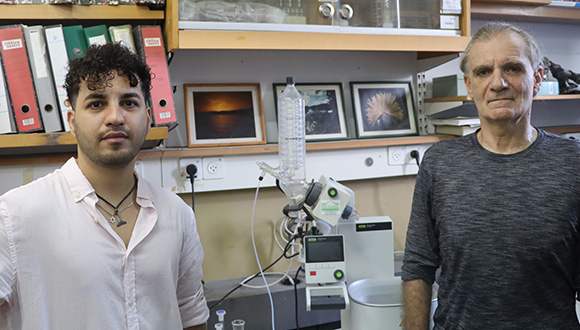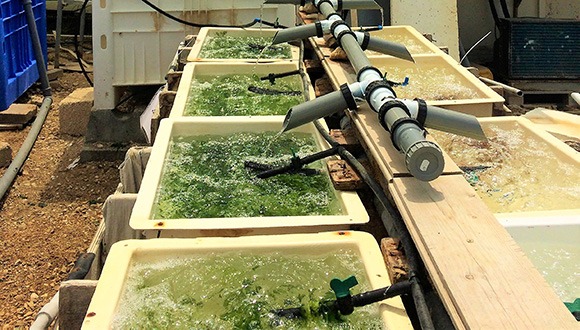After developing an innovative technology that enables the growth of seaweed enriched with proteins and minerals such as zinc, iron, iodine, magnesium, and calcium for humans and animals, researchers from Tel Aviv University’s School of Zoology at The George S. Wise Faculty of Life Sciences and the Israel Oceanographic and Limnological Research Institute (IOLR) have made a new advancement: They succeeded in significantly increasing the ability of seaweed to produce healthy natural substances, focusing on enhancing the production of bio-active compounds that offer medical benefits to humans, such as antioxidants – the concentration of which was doubled in the seaweed; natural sunscreens – its concentration tripled; and unique protective pigments of great medical value, the concentration of which increased by ten-fold.
The study was carried out with the innovative and sustainable approach of integrated aquaculture, which combines seaweed with fish cultivation, upgrading the seaweed while at the same time helping to purify the seawater and minimizing negative environmental impacts. According to the researchers, these findings may serve the pharmaceutical, cosmetics, food, and nutritional supplement industries.
Manufacturers of Valuable Compounds
The new development was led by Ph.D. student Doron Ashkenazi of Tel Aviv University and the Israel Oceanographic and Limnological Research Institute, under the guidance of Prof. Avigdor Abelson of Tel Aviv University’s School of Zoology and Prof. Alvaro Israel of the IOLR in Haifa, in collaboration with other leading researchers from Israel and around the world, including Guy Paz from IOLR; organic chemistry expert Dr. Shoshana Ben-Valid; Dr. Eitan Salomon from the National Center for Mariculture in Eilat; and Prof. Félix López Figueroa, Julia Vega, Nathalie Korbee, and Marta García-Sánchez from Malaga University in Spain. The article was published in the scientific journal Marine Drugs.

Ph.D. student Doron Ashkenazi (left) and Prof. Avigdor Abelson (right)
Doron Ashkenazi explains that “seaweed, also known as macroalgae, are marine plants that form the basis of the coastal marine ecosystem. The seaweed absorb carbon dioxide and release oxygen into the environment. They purify the water, provide food, habitat, and shelter for numerous species of fish and invertebrates. Not many know that seaweed also produce a wide variety of distinct bio-active compounds that are beneficial to humans. The seaweed living in the intertidal zone face extreme stress conditions, which include changes in salinity, temperature, desiccation [loss of moisture] conditions, changes in the availability of nutrients and high exposure to solar radiation, especially in the ultraviolet (UV) range.”
“Not many know that seaweed also produce a wide variety of distinct bio-active compounds that are beneficial to humans.” Doron Ashkenazi
To survive, the seaweed has developed a unique set of chemical defense mechanisms – natural chemicals that help them cope with these harsh environments. They are highly efficient natural factories that produce valuable substances that may offer significant benefits to humans.
In the current study, they sought to examine whether and how it is possible to increase and maximize the seaweed’ production of bio-active compounds, and secondary metabolites, that offer significant health benefits. These substances include antioxidants, protective pigments, and natural UV radiation filters.

A dedicated aquaculture system where the researchers grew three local species of algae
Future Looking Greener Than Ever?
To this end, the researchers developed an original and practical cultivation approach, whereby three local seaweed – Ulva, Gracilaria and Hypnea – were initially grown alongside fish effluents, and subsequently exposed to stressors including high irradiance, nutrient starvation, and high salt content.
They investigated how these changes affected the concentration of specific valuable biomaterials in the seaweed, to enhance their production. The results were impressive: antioxidant levels had doubled, seaweed natural sunscreen molecules tripled, and protective pigments were increased by ten-fold. “We developed optimal cultivation conditions and invented a new and clean way to increase the levels of healthy natural bio-active compounds in seaweed to an unprecedented level,” says Ashkenazi. “We in fact produced ‘super seaweed’ tailor designed to be utilized by the emerging health industries for food and health applications.”
“In the future, humanity will focus on creating science-based environmental solutions (…) technologies that promote recycling and the sound use of natural resources without overexploiting them.” Doron Ashkenazi
The researchers believe that in the future it will be possible to use their cultivation approach to elevate in seaweed additional natural materials with important medical properties, such as anti-cancer, anti-diabetic, anti-inflammatory, anti-viral, and ant-biotic substances.
They also emphasize that seaweed aquaculture is environmentally friendly, preserving the ecological balance, and reducing environmental risks by minimizing excessive amounts of pollutants caused by humans, reducing the emission of greenhouse gases, and lowering the carbon footprint. In this way, seaweed aquaculture can help cope with global environmental challenges such as pollution, habitat loss, and the climate crisis.
“In the future, humanity will focus on creating science-based environmental solutions, like the one we offer in this study – technologies that promote recycling and the sound use of natural resources without overexploiting them. Our study demonstrates how we can enjoy nature without harming it,” concludes Ashkenazi.

